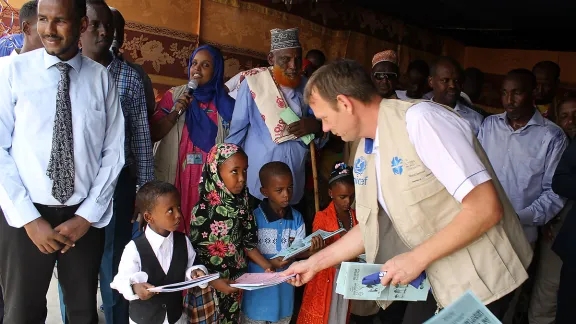
LWF Country representative Lennart Hernander hands out the school books from the new curriculum to first year students. Photo: LWF Kenya-Djibouti
Government of Djibouti integrates refugees into national education system
Refugee students in Djibouti will from now on be integrated into the national education system. This was celebrated in a ceremony on Sunday, 10 September 2017 in the Ali Addeh refugee camp, when the Government of Djibouti officially welcomed refugee children into the national education system. The new curriculum starts for grade 1 students this year. The following grades will be introduced during the coming years.
The Ali Addeh and Hol Hol refugee camps were established in 1992. They are home to about 23,000 refugees who are predominantly from Somalia, Ethiopia and Eritrea.
Curriculum based on Kenyan system
At first, children were taught without a structured curriculum. When LWF took over education services in 2009, it developed a structured Kenyan primary school curriculum in English, adapted to the refugees’ contexts in Djibouti. At that time the Djibouti national French language curriculum was not available to refugees.
This curriculum was not officially recognized by the Government and for that reason, exams and grades could not be certified. During the past year, education officials in the Djibouti Government, together with the Governments of Japan and the United States, UNHCR, UNICEF and LWF have developed an English language education curriculum that is certified by the government and available for citizens as well as refugees in Djibouti.
Right and Responsibility
The ceremony at Wadajir Primary School in Ali Addeh camp marked the successful conclusion of this process.
The right to education is also the responsibility to educate. I applaud the ministry for taking such a major step. It is a happy moment after eight years of LWF work in education in Djibouti.
“The right to education is also the responsibility to educate,” Lennart Hernander, LWF Representative in Kenya and Djibouti, said. “I applaud the ministry for taking such a major step. It is a happy moment after eight years of LWF work in education in Djibouti.”
“This is only the beginning,” an Eritrean community leader said. “But we are laying a foundation for the future.”
UNHCR’s Acting Representative, Mr. Albert Katumba appreciated the Head of State, Government and the Ministry of Education for their commitment to refugee education. He also acknowledged the Ministry’s openness to collaborate with UNHCR and partners in defining the next steps.
Government commitment to quality education
The Minister for Education and Vocational Training in Djibouti, His Exellency Moustapha Mohamed Mahamoud, emphasized that he was visiting a refugee camp for the first time, to assure the government’s commitment to quality education for all children living in Djibouti. He told the children in the camp that “they were at home” and assured them of his ministry’s commitment to enable them to pursue their dreams. He was accompanied by representatives from the Office National d'Assistance aux Réfugiés et Sinistrés (ONARS).
The minister also acknowledged LWF for “a job well done in filling the gap in education and being there for the children”. The ministry will work together with LWF during the transition period. “This is also an opportunity for LWF to continue working together with the Ministry for the education of refugees,” LWF Representative Hernander said.
The Prefet of Ali-Sabieh stated that efforts to integrate refugee education with the national education system marked yet another step of the Djibouti Government’s commitment to uphold human rights. “I believe that offering refugees a certified curriculum and commitment to quality education will protect the children.”
Dream of the future
Addressing the young students in the audience, UNICEF representative, Ms Djanabou Mahonde, said “Through this certified curriculum, each one of you can now dream of being in any career you choose.”
Mr. Hermes Grullon, Political Officer at the US Embassy in Djibouti acknowledged the team effort on achieving this milestone. He called upon the children and youth “to take their future into their own hands” and encouraged parents to send their children to school - both boys and girls.
LWF implements primary education in the refugee camps in Djibouti with significant support from ECHO, UNHCR, UNICEF, Church of Sweden and the Australian Lutheran World Service. Previously, Finn Church Aid and Diakonie Katastrophenhilfe have also supported LWF education work.


